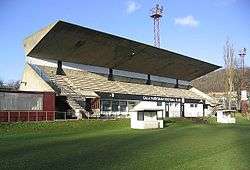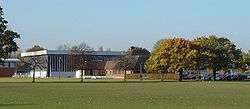Peter Womersley

Peter Womersley (24 June 1923–1993) was a British architect, best known for his work in the modernist style. He lived in the Scottish Borders, where a number of his buildings are located, although he worked on projects throughout the UK. Influenced principally by the work of Frank Lloyd Wright, and by the American Case Study Houses, Womersley's buildings employ such typical modernist elements as in-situ concrete and strong geometric forms, although he introduced a wider palette of materials than was typically used by Le Corbusier and his followers.
Biography
Womersley was originally intending to study law at Cambridge University, but was called up for service in the Second World War. He saw little action, however, and from 1946–1951 he studied architecture at the Architectural Association in London. He spent time in Kuwait, where he assisted in the design of a palace for a sheikh.[1]

In 1952 he was admitted to the Royal Institute of British Architects (RIBA). His first commission was a house for his brother, John Womersley, at Farnley Tyas near Huddersfield. This house, known as Farnley Hey, won the RIBA bronze medal in 1958, and has been described as "one of the best demonstrations of the influence of Frank Lloyd Wright in Britain."[2] The house is located in woodland, at the edge of a steep valley, and features pale lilac-coloured brickwork, extensive glazing, and timber boarding. Although designed in 1952, construction only began in 1954 after planning rules were changed. Womersley designed an extension in 1956.

Womersley then moved to the Scottish Borders, where he built The Rig, his home and studio in Gattonside near Melrose, in 1957.[1] The same year, he worked on a house for the textile artist Bernat Klein near Selkirk. This house, High Sunderland, was also located in dense woodland, within the parks of the 19th-century Sunderland Hall, and was decorated internally with fabrics of Klein's own designs. The modular design has been described as a forerunner to Benjamin's Mount (1967), a house by Ernő Goldfinger.[3] Womersley continued to concentrate on private houses, but obtained relatively few commissions. However, his practice began to take off in 1961 when he won the competition to design the Roxburgh County Offices (now the headquarters of Scottish Borders Council), and also gained a commission for a sports centre at the University of Hull. His practice remained small, with no more than five employees, but Womersley produced a number of notable buildings until the late 1970s.[1]
The Nuffield Transplantation Surgery Unit (1963) at Edinburgh's Western General Hospital was "the first experimental building specifically designed for the transplantation of human organs."[4] Other healthcare projects included an admissions unit for Haddington District Asylum (1963), now the Garlton Unit of Herdmanflat Hospital, and a GP's practice in Kelso. Collaborating with engineers Ove Arup, he designed a stadium for Gala Fairydean F.C. (1963), incorporating cantilevered structures of board-marked concrete to create the effect of a floating canopy.[5] In 1969 he designed a studio for Bernat Klein, adjacent to High Sunderland. Strongly reminiscent of Frank Lloyd Wright's Fallingwater, the studio remains Womersley's best-known building, and was nominated as one of Scotland's 100 "Treasured Places" in 2008.[6] The same year he was commissioned to design an extension to Edinburgh College of Art, but his highly articulated proposals were rejected.[7] Later designs include the "sculptural" boiler house at the former Melrose District Asylum,[8] and Monklands Leisure Centre in Coatbridge (both 1977).
High Sunderland, the Bernat Klein Studio and Gala Fairydean Stadium are now protected as Category A listed buildings, the highest level of protection for a building in Scotland of "special architectural or historic interest".[9] In addition, The Rig and the Garlton Unit in Haddington were listed at Category B in 2007.[10] In England, Farnley Hey is listed at Grade II by English Heritage.[11]
Significant works
| Name | Location | Date | Notes | Coord. | Ref. |
|---|---|---|---|---|---|
| Farnley Hey | near Farnley Tyas, Huddersfield, West Yorkshire | 1952–1955 | Private house for the architect's brother, extended by the architect 1956. Grade II listed. | 53°36′43″N 1°46′16″W / 53.61194°N 1.77111°W | [11][12] |
| High Sunderland | near Selkirk, Scottish Borders | 1956 | Private house for textile designer Bernat Klein. Category A listed. | 55°34′28″N 2°50′12″W / 55.57444°N 2.83667°W | [3][13] |
| The Rig | Gattonside, Scottish Borders | 1956 | Womersley's own house and studio, converted into two houses by the architect in 1978. Category B listed. | 55°36′28″N 2°43′32″W / 55.60778°N 2.72556°W | [14][15] |
| Valley Spring | Bath, Somerset | 1960s | House | 51°21′24″N 2°21′41″W / 51.35667°N 2.36139°W | [16] |
| House | Port Murray, Maidens, South Ayrshire Demolished August 2016 | 1960–1963 | 55°19′57″N 4°49′42″W / 55.33250°N 4.82833°W | [17][18] | |
| Church Square | Galashiels, Scottish Borders | 1961 | 55°36′46″N 2°48′21″W / 55.61278°N 2.80583°W | [19] | |
| Murray and Sanderson offices | Galashiels, Scottish Borders | 1961 | Now occupied by Cameron Associates, architects | 55°37′16″N 2°48′57″W / 55.62111°N 2.81583°W | |
| Fairydean Stadium | Galashiels, Scottish Borders | 1963 | Still in use, Category A listed. | 55°36′23″N 2°47′03″W / 55.60639°N 2.78417°W | [5] |
| North Lodge, Haddington District Asylum | Haddington, East Lothian | 1963 | Now the Garlton Unit, psychiatric admission unit at Herdmanflat Hospital. Category B listed. | 55°57′37″N 2°47′17″W / 55.96028°N 2.78806°W | [20] |
| Nuffield Transplantation Surgery Unit | Western General Hospital, Edinburgh | 1963 | Still in use, extended in 2007 by Aitken Turnbull. | 55°57′40″N 3°13′58″W / 55.96111°N 3.23278°W | [4][21] |
| University of Hull Sports Centre | Kingston upon Hull, East Riding of Yorkshire | 1963–1965 | Still in use, included on local buildings list by Hull City Council. | 53°46′26″N 0°22′08″W / 53.77389°N 0.36889°W | [22][23] |
| Edenside Group Practice Surgery & Caretaker's House | Kelso, Scottish Borders | 1965 | Still in use, though altered. | 55°36′14″N 2°25′49″W / 55.60389°N 2.43028°W | [24] |
| Roxburgh County Buildings | Newtown St Boswells, Scottish Borders | 1966 | Roxburgh County Buildings Phase I, following competition of 1961. Now the headquarters of Scottish Borders Council, with recent extensions | 55°34′40″N 2°40′26″W / 55.57778°N 2.67389°W | [25] |
| Bernat Klein Studio, High Sunderland | near Selkirk, Scottish Borders | 1969 | Studio adjacent to High Sunderland house, for textile designer Bernat Klein. Modified c.2006. Category A listed. | 55°34′24″N 2°50′13″W / 55.57333°N 2.83694°W | [26] |
| Midland Bank | New Street, Huddersfield | 1971 | Now HSBC | 55°34′24″N 2°50′13″W / 55.57333°N 2.83694°W | [27] |
| Boiler House, Melrose District Asylum | near Melrose, Scottish Borders | 1977 | Undergoing conversion to domestic residential use | 55°35′28″N 2°43′44″W / 55.59111°N 2.72889°W | [8][28] |
| Monklands Leisure Centre | Coatbridge, North Lanarkshire | 1977 | Still in use | 55°51′35″N 4°02′08″W / 55.85972°N 4.03556°W | [29] |
References
- 1 2 3 "Charles Peter Womersley (known as Peter Womersley)". Dictionary of Scottish Architects. Retrieved 16 June 2010.
- ↑ Gibson, Keith; Booth, Albert (2009). "The Buildings of Huddersfield" (PDF). The History Press. p. 140.
- 1 2 "High Sunderland, Listed Building Report". Historic Scotland. Retrieved 2 July 2010.
- 1 2 "Western General Hospital, Nuffield Transplantation Surgery Unit". Dictionary of Scottish Architects. Retrieved 11 June 2010.
- 1 2 "Gala Fairydean Football Stadium, Listed Building Report". Historic Scotland. Retrieved 2 July 2010.
- ↑ "Bernat Klein Studio". Treasured Places: Scotland's favourite archive images. Royal Commission on the Ancient and Historical Monuments of Scotland. Retrieved 1 July 2010.
- ↑ Glendinning, Miles, ed. (1997). Rebuilding Scotland: The Postwar Vision, 1945-1975. Tuckwell Press. pp. 36–37. ISBN 1-898410-33-X.
- 1 2 "Waste Incinerator (Boiler House)". Risky Buildings. The Twentieth Century Society. Retrieved 2 July 2010.
- ↑ Guide to the Protection of Scotland's Listed Buildings (PDF). Historic Scotland. 2009. p. 4. ISBN 978-1-84917-013-0. Retrieved 5 May 2010.
- ↑ "Pioneering Scottish architect recognised by Historic Scotland". Historic Scotland. 24 July 2007. Retrieved 1 July 2010.
- 1 2 "Farnley Hey". Images of England. English Heritage. Retrieved 16 June 2010.
- ↑ "Farnley Hey". Dictionary of Scottish Architects. Retrieved 16 June 2010.
- ↑ "High Sunderland". Dictionary of Scottish Architects. Retrieved 16 June 2010.
- ↑ "The Rig, Listed Building Report". Historic Scotland. Retrieved 1 July 2010.
- ↑ "The Rig". Dictionary of Scottish Architects. Retrieved 16 June 2010.
- ↑ "The Modern House in Bath: Peter Womersley's Valley Spring". Royal Institution of British Architects. Retrieved 2 July 2010.
- ↑ "Port Murray, Maidens". Dictionary of Scottish Architects. Retrieved 16 June 2010.
- ↑ "Maidens, Port Murray". CANMORE. Royal Commission on the Ancient and Historical Monuments of Scotland. Retrieved 2 July 2010.
- ↑ "Town Trail". Galashiels Town Web Site. Retrieved 2 July 2010.
- ↑ "Garlton Unit, Listed Building Report". Historic Scotland. Retrieved 2 July 2010.
- ↑ "Extension and upgrading to Ward 1, Western General Hospital Edinburgh". Aitken Turnbull Architects. Retrieved 16 June 2010.
- ↑ "Local Buildings List" (PDF). Hull City Council. Retrieved 16 June 2010.
- ↑ "Stage One". Design. Visual Arts Data Service. 208: 57. 1966. Retrieved 16 June 2010.
- ↑ "Edenside Surgery". CANMORE. Royal Commission on the Ancient and Historical Monuments of Scotland. Retrieved 2 July 2010.
- ↑ "Roxburgh County Buildings". Dictionary of Scottish Architects. Retrieved 2 July 2010.
- ↑ "The Studio, High Sunderland, Listed Building Report". Historic Scotland. Retrieved 2 July 2010.
- ↑ Gibson, Keith; Booth, Albert (2009). "The Buildings of Huddersfield" (PDF). The History Press. p. 143.
- ↑ "Roxburgh Berwick and Selkirk District Asylum, Boiler House". CANMORE. Royal Commission on the Ancient and Historical Monuments of Scotland. Retrieved 2 July 2010.
- ↑ "Monklands Leisure Centre". Dictionary of Scottish Architects. Retrieved 2 July 2010.
External links
| Wikimedia Commons has media related to Peter Womersley buildings. |
- Renovation of the Bernat Klein Studio, by Studio DuB Architects
